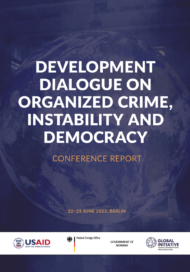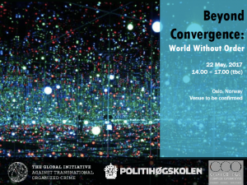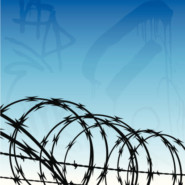Event Details
Posted on 27 Sep 2013
GITOC The Global Initiative Against Transnational Organized Crime was pleased to host over over 100 representatives from diverse, globally representative states, international organizations, civil society and think tanks at its launch event in the UN Building in New York.
The launch was intended as an opportunity to have an open-ended, multi-stakeholder debate about some organized priority topics, and in doing so, to demonstrate where the Global Initiative can add value to strengthening responses to this growing and dynamic threat to peace, stability and economic and social development. The goal of the launch as a whole is to debate the state of play in these three priority areas, to evaluate current responses and to see where the Global Initiative with its Network of Experts can add value to catalyzing new approaches.
The event featured a keynote speech by Moisés Naím of the Carnegie Endowment for International Peace and author of “Illicit: How Smugglers, Traffickers, and Copycats Are Hijacking the Global Economy”. Naím gave a thought-provoking introduction which highlighted the eight things we really still don’t know or understand about organized crime, and why that matters for the way that we set policy and determine our priorities. In particular, he noted that the debate is often split between those who consider organized crime just to be traditional illicit trafficking in it’s latest mutation; whereas others see truly new and distinct trends and dynamics that make it a bigger and more credible threat.
Mark Shaw, Director of the Global Initiative, explained the context from which the Global Initiative had been derived – very much as a response to some of the challenges that Dr. Naim had described in his speech. He described the way the Global Initiative has been shaped, what it hopes to achieve and its priorities for the future. In particular, the Global Initiative is keen to try and add value in three areas, which are represented by the topics of the panel at the launch: on cybercrime, environmental crime, and on improving understanding and responses to the way that organized crime impacts on stability, governance, and development. Read the full text of his speech here.
The first panel discussion was on Organized Crime, Democracy, Development, and State Fragility, with the panel made up of Vidar Helgesen, Secretary-General of International IDEA, who provided some observations on the relationship between organized crime and politics, examining case thee studies: the Baltics, Latin America and Sweden. His speech highlighted the ways in which organized crime hijacks and critically undermines democracy and democratic processes (full text here). Sarah Cliffe, Special Adviser and Assistant Secretary-General for the Civilian Capacities Unit reiterated some of the conclusions from the World Development Report 2011, including the strong correlations and linkages between organized crime and violence and conflict, and the extent to which this obstructs sustainable development. James Cockayne, a leading scholar on the impact of organized crime on statehood and state fragility explored what he described as the “Crime-Fragility Trap” – a vicious cycle where criminal rent seeking exacerbate the conditions that make countries vulnerable to organized crime (full text here). Rodrigo Avila, a senior advisor on security to the Government of El Salvador brought the remarks home by recounting some of the challenges faced in his country to address the deleterious effects of organized crime on human security.
The second panel debated the urgent need to strengthen responses to Environmental Crime, and was centered around the draft conclusions of a research study by the Global Initiative, which assesses the state of the global responses to environmental crime. The author, Justin Gosling, presented the key findings (presentation here) of the report that will be released shortly, which highlighted the time-critical nature of environmental crime. Responses were given by John M. Sellar OBE, former CITES Chief of Law Enforcement and independent expert, who reflected on twenty years of insufficient efforts and missed opportunities, warning that we are reaching the tipping point, where whatever we might do in response will be too little, too late to reverse irreparable damage to the environment. Julian Rademeyer, journalist and author of the best-selling book “Killing for Profit – Exposing the illegal rhino horn trade” told a similar story, of sophisticated transnational operations, poaching rhinos and elephants from Africa to feed demand in Asia. He described an uphill struggle to achieve impact, when despite kingpins being well-known, they cannot be caught.
The final panel Countering the Cybercrime Avalanche, moderated by moderated by Jeff Frazier, General Manager, World Wide Government, National Security and International Organizations, Microsoft, with interventions from Troels Oerting, Head: European Cybercrime Centre with interventions from Raj Samani, Chief Technology Officer from McAfee and John Suffolk, Global Head of Cyber Security, Huawei. They described the bleak landscape of a dynamic criminal market which is now almost impossible to respond to effectively – the internet has fundamentally changed the nature of crime and policing, as there is no longer a direct link between criminal and crime. The industry is innovative, well resourced and low-risk since detection is almost impossible. Without a coherent and consolidated global response, fighting cybercrime is a potent threat to human security, the economy and to global development.
The day of meetings was concluded by a cocktail event at the International Peace Institute premises in New York. A photo diary of the evening is available on our facebook page, so please go and meet the faces behind the names of the Global Initiative.



